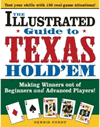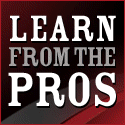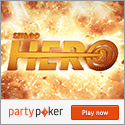If you are looking for a fantastic source of information on poker strategy most professional players will tell you to go read a book. Some players prefer Doyle Brunson’s Super System and others are partial to David Sklansky’s The Theory of Poker. There are dozens of books on poker strategy available and more are coming out every year. I have listed a few of the more popular books below and the type of information each covers.
The Theory of Poker by David Sklansky
This book is thought by many to be the single most important book on poker ever written. It covers just about every situation and strategy you can think of. It is most useful for intermediate players; beginners will not understand the terms or games, and professionals already know the lessons instinctively. It is very detailed, almost to the point of being overwhelming, but if you learn and practice every lesson this book teaches, you will win.
Super System by Doyle Brunson
This book is really the first major modern book of poker. It provides good advice for beginners and advances into more detailed advice for intermediate players. The book assembled some of the greatest poker players ever to go over game strategy for different game variations including Hold’Em, 7 Card Stud, and Draw Poker. Some of the games have changed or have become obsolete since the book was introduced, but the strategy is still invaluable.
Play Poker Like the Pros by Phil Hellmuth, Jr.
This was the first poker book I ever read. I hope nobody else makes the same mistake. The book has a lot of very useful strategies, unique information, and explanations which beginners can understand. Everything makes sense. The problem I had with the book is that it is written assuming the players you are up against are good. The strategies in the book do not work playing at a $1 limit table on Ultimate Bet because the players at those tables are horrible. Still, the book is very informative and easy to understand. I remember and continue to use many of the poker lessons I learned from this book.
Get the Edge at Low-Limit Texas Hold’em by Bill Burton
This is a very good book for beginners. Burton does not take it for granted that the reader knows terms or strategies. The book seems to be written for players making their first trip to a casino poker game so the strategy is relatively basic and the examples are realistic. The advice focuses on playing conservatively, a great approach for players needing to gain experience without losing a lot of money.
The Illustrated Guide to Texas Hold'em by Dennis Purdy (sourcebooks.com)
 Another
excellent poker for beginning low limit Texas Hold'em players. It starts
with a very good write up on Texas Hold'em basics: game rules, the difference
between Limit and No Limit Hold'em, nine recommendations for good basic
strategy, and actual odds vs. pot odds. The main content of the book
is the 150 fully illustrated real-game situations (pages 30-329). Each
diagram invites you to make your own playing decision based on the information
presented. The author will then give his answer on the next page in
clear and unambiguous terms. This book is highly recommended for new
players for two reasons. First, pictures are more easily remembered
than words, and second, the decision-making format allows you to get
some hands-on experience quickly without losing any of your valuable
dollars in a real game.
Another
excellent poker for beginning low limit Texas Hold'em players. It starts
with a very good write up on Texas Hold'em basics: game rules, the difference
between Limit and No Limit Hold'em, nine recommendations for good basic
strategy, and actual odds vs. pot odds. The main content of the book
is the 150 fully illustrated real-game situations (pages 30-329). Each
diagram invites you to make your own playing decision based on the information
presented. The author will then give his answer on the next page in
clear and unambiguous terms. This book is highly recommended for new
players for two reasons. First, pictures are more easily remembered
than words, and second, the decision-making format allows you to get
some hands-on experience quickly without losing any of your valuable
dollars in a real game.
Internet Texas Hold'em by Matthew Hilger
Matthew Hilger has been playing poker online successfully for the last few years. He has done well in live tournaments, too. From those experiences to today, he shares what he has learned from playing over seven thousand hours online in his book, Internet Texas Hold'em: Winning Strategies from an Internet Pro, which specifically focuses on limit Texas Hold'em. If you are thinking about playing on the internet, this is the book for you.
The Tao of Poker - Larry W. Phillips
I have often felt that there is a connection between poker and philosophy. I was intrigued when I first heard about Larry Phillips’ first book, Zen and the Art of Poker where he attempted to show the correlation between Zen Buddhism and poker. I wondered how he could combine Taoism and poker. Tao is roughly translated as “the way” or “the path.” Basically the Tao cannot be described. It has to be lived. The Tao is the power which surrounds and flows through all things living and non-living. The symbol of Taoism is the Yin Yang. This represents balance in the universe, which the Tao regulates.
Small Stakes Hold'em: Winning Big with Expert Play
This book is not for novices. It is designed for players who already have a grasp on the game. The authors are very blunt when they say that, “This book picks up where all other beginner books leave off.” Indeed, the premise of Small Stakes Hold’em is not just to turn you into a better player, but its goal is to also teach you how to become a consistent winning player by teaching the reader a tight-aggressive-attacking style.
Books are a great source of information for players of all levels. You can learn how to play the game without any help from the experts, but why would you try? Reading books, articles, and online information will take years off of your poker learning curve.
Some good Swedish reviews of Super System and Sklansky's Theory of Poker are available at the pokersidan.se online poker guide.


